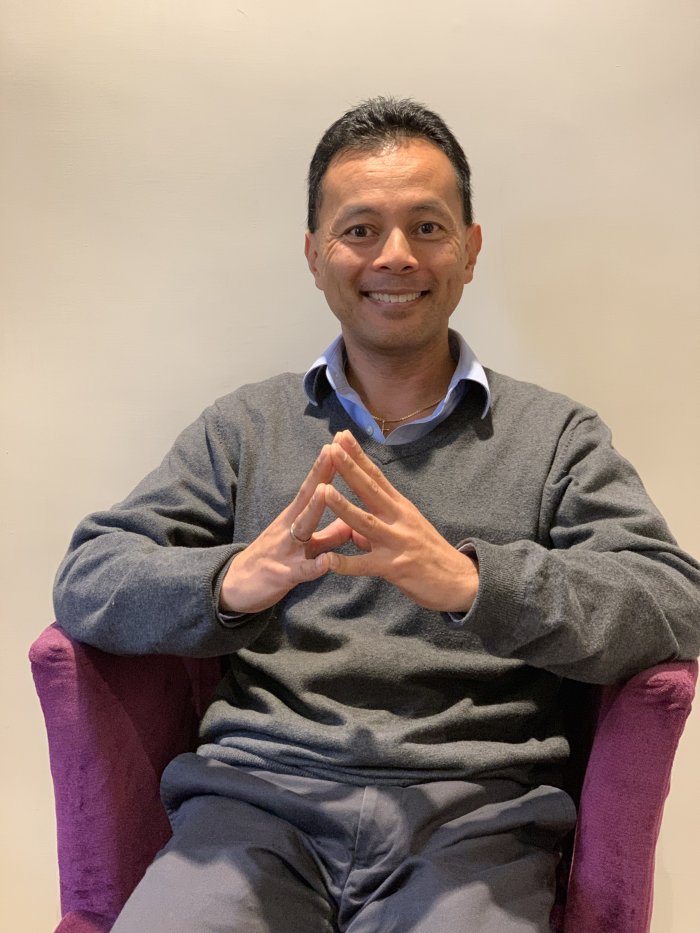Building a Healthy Business on Customer Service

The driving force behind FirstMed Clinics, Dennis A. Diokno, says this is an extremely interesting time to be in the private healthcare business in Hungary, but it was a career he might never have had. If life had followed another path, he could now be a Coca-Cola executive.
Dennis A. Diokno
FirstMed, a multi-disciplinary clinic based in the Hattyúház building close to the Széll Kálmán tér metro station in Buda’s District II, will celebrate its 20th anniversary in February. When he opened up the business here, Diokno had already done something similar in Russia and then China.
Having graduated from Thunderbird School of Global Management in 1991 with a Master of International Management degree, and with interesting jobs hard to find in the United States, Diokno took himself off to Moscow. He quickly got three interviews. Nothing came from the first with a pharma company, but the second was with Coca-Cola. He was offered a job, pending the approval of the country manager, who was out of Russia for six weeks.
“Had he been in Moscow at the time and offered me a confirmed position, I would probably have taken it,” Diokno says. The third interview was as little more than an intern for a small private clinic. “I was itching to do something, and I thought I could always go back to Coca-Cola six weeks later. I never did.”
He started in March 1992 and progressed rapidly through the ranks; in less than a year he was marketing director and operations manager, and was promptly hired away by another company to open and run a clinic in Beijing.
More healthcare work followed in China, and then in the late ’90s he was sent by his chairman-CEO to look at the possibilities of opening a clinic in Budapest, Prague or Warsaw. “In the end he decided not to invests, so I raised money through family and friends and did it myself.”
Looking to Return
“I wanted to come back to Europe,” Diokno recalls. “Even though I am of Asian heritage, my background was in European studies. China is a great place to visit, but it is difficult doing business if you are young and don’t speak the local dialect. I spoke German and reasonable Russian at the time, but that market would have been difficult to get back into then. I really liked Hungary; it seemed like the right place to be.”
It was also the right business. Diokno not only had practical experience, but also grew up around healthcare. His father was a physician; his mother a nurse; his two sisters work in the pharmaceutical industry. Only his brother has followed a different path, and works for Apple. “This is what I should be doing; it is a service industry, and I love customer service.”
The business was initially known as the American Clinic, but while the parent company is still American Clinics International, the business name was changed to FirstMed shortly after 9/11, partly over safety concerns, but also partly because it better reflected the reality.
“When we first started we might have had more North American patients, but after a few years there were more from Europe, Asia and the Middle East.” He estimates that around 75% of the client base are still expats – either posted here for a specific job or living here and working as local hires – with the remainder Hungarians. While the expat base is fairly stable, it is the local business that is growing.
“It’s driven by growing awareness of us and private healthcare in general; greater disposable income; and the condition of the state healthcare system. And I think that third one is the largest driver.”
Horror Stories
Very few readers will not have heard horror stories of underfunded state hospitals lacking toilet paper or even soap in public restrooms. Buildings are often in clear need of maintenance, or at the very least a fresh coat of paint. Staff are underpaid, overworked and, increasingly, leaving the profession; in one famous case reported on our bbj.hu website back in June 2017, the Number 3 internal medicine department of Jáhn Ferenc Hospital in southern Pest was closed for a while due to the number of nursing staff quitting their jobs for better wages at the nearby newly opened IKEA store.
More than that, the unofficial so-called “gratuity” system, where patients pay doctors or nurses a “tip” for the care they should be getting free to speed up the treatment narrows the gap between state healthcare and private.
“People appreciate the transparency of knowing upfront what you will pay for a service and getting better customer service and a better all-round experience,” Diokno believes. But he takes no pleasure from the situation and is at pains to point out it that the landscape is not universally bleak.
“There are pockets of very good healthcare out there; we have arrangements with two or three hospitals where we send patients in more serious cases if it is needed. I feel for the people; it is a difficult situation, although Hungary is not the only place in the world with healthcare challenges; just look at the United States. My business continues to improve because the state system lacks funding and support, and not just my business, but all private clinics.”
Diokno says FirstMed’s prices are at the higher end of what the local private healthcare market charges, but even so the growth is clear. Customer service is an important differential, although he says the local private providers are catching up in this regard. There is also a certain section of Hungarian society that likes the “prestige” of going to an international healthcare provider.
There is one other advantage FirstMed can offer expats and Hungarians alike: “You don’t have to navigate yourself around the system; we were one of the first private clinics to have a one-stop shop service.”
Family Practice
Having started out marketing itself as a family practice or primary care facility – general practice, some gynecology, pediatrics and orthopedics – it has grown to the extent that it now employs about 100 people, the vast majority Hungarians.
“We have about 30 different specialties now. We have cardiology three times a week; ear, nose and throat almost every day; psychology and psychiatry. This year we will see 18,000-19,000 patient visits. The growth has been phenomenal over the past 18 months.”
Not that everything has gone according to plan. For about five years, FirstMed had a sister clinic in the residential area of Hűvösvölgy, further out in Buda, but that closed last year. “We got the location wrong,” Diokno says with brutal honesty. “Our thinking was to be where the people were living, to make it easier to visit. But it turns out it is more convenient to come into the city and have an appointment before or after work or during lunch. It was very difficult to make it work; it struggled to break even, while this place [Hattyúház] continues to grow: it is at capacity on some nights.”
He says he has a “list of mistakes” he has made, such as taking on too much space too soon at the first location. “For the first six months things were pretty dead, and then things stated picking up, but I had three times as much space as I needed.” That’s far from the case now. FirstMed has the whole of the fifth floor and is negotiating over more space on the fourth.
“Next year we are looking at adding some day surgery; nothing too complicated, but a lot of scope cases. Eventually we might buy an arthroscope device: our orthopedics business is very strong, but the price point is not quite there yet for me to justify it.” For now, MRI or CT imaging is not in the picture – if you will excuse the pun. Diokno says it does hold potential, but others are already doing it and he does not wish to “compete in that space”.
International Expansion
There are other spaces where he is happy to compete, however. “We will be opening in Rome sometime in the next six-to-twelve months. We are also looking at international expansion into other capital cities in Central and Eastern Europe. To start off, the healthcare offer would be very similar to what we first had in Hungary, before the model here became more comprehensive.”
He described this as “urgent care services”, sometimes known as immediate care, dealing with stitches and sprains, coughs and lab work. “There is a burgeoning urgent care industry in the Unites States right now,” Diokno explains.
“In Hungary we are looking to expand into other cities, and in Budapest to expand our range of services.”
The healthcare sector is attracting a lot of interest he says, and he has received offers to take over the business. While his approach is “everyone has his price”, for now he insists he is going nowhere, although he has taken on a new investment partner: Nimród Kovács, the former UPC boss-turned-wine maker and philanthropist, and a fellow Thunderbird alumnus.

SUPPORT THE BUDAPEST BUSINESS JOURNAL
Producing journalism that is worthy of the name is a costly business. For 27 years, the publishers, editors and reporters of the Budapest Business Journal have striven to bring you business news that works, information that you can trust, that is factual, accurate and presented without fear or favor.
Newspaper organizations across the globe have struggled to find a business model that allows them to continue to excel, without compromising their ability to perform. Most recently, some have experimented with the idea of involving their most important stakeholders, their readers.
We would like to offer that same opportunity to our readers. We would like to invite you to help us deliver the quality business journalism you require. Hit our Support the BBJ button and you can choose the how much and how often you send us your contributions.







